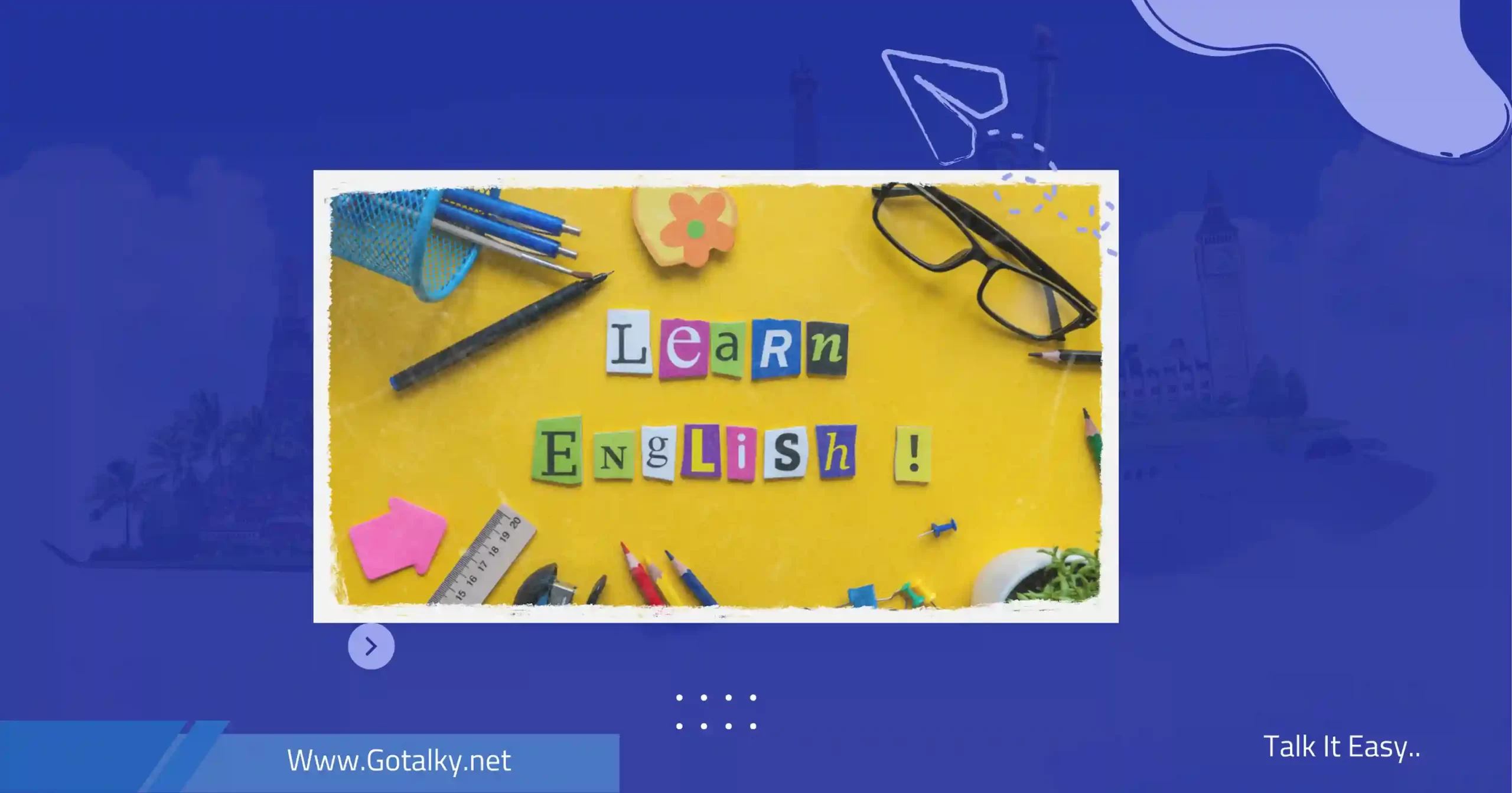Negotiation is a powerful and effective tool used to handle difficult and conflicting situations. It is a process that requires clear skills and a thoughtful strategy to achieve the desired results in a negotiation dialogue. Negotiation is considered an essential part of both personal and professional life, used in business dealings, personal relationships, politics, and even in daily life.
GoTalky possesses extensive linguistic knowledge, trained on a variety of sources and texts. It can provide information and assistance in grammar rules, syntax, vocabulary, and even colloquial expressions. Additionally, GoTalky can help correct language errors and improve your English language skills. It also provides anyone who wants to improve English speaking with a variety of courses like the speaking English course, English speaking classes, the online English course, the English fluency course, spoken English lessons, the English speaking training, the advanced English course, the speaking and pronunciation course and so much more. Finally, You can ask language-related questions and challenges, receiving instant clarifications and corrections to enhance your proficiency.
What is Negotiation Language?
Negotiation language is considered a crucial tool in the negotiation process, contributing to effective communication between involved parties. It relies on the use of words and expressions aimed at influencing the other side and conveying messages clearly and effectively. It involves the use of linguistic analysis of expressions and linguistic influence techniques, such as employing positives and avoiding negatives, using persuasive arguments supported by examples and statistics. Negotiation language is a powerful tool for building trust, enhancing mutual understanding between parties, and achieving desired outcomes.
What are the Elements of Negotiation?
The elements of negotiation form the basis upon which the negotiation process relies. These elements include the interests and objectives that each party seeks to achieve, the issues and matters negotiated, the needs and requirements that must be met, and the settlements and concessions made. By analyzing and effectively using these elements, a communication bridge is built between the parties, achieving consensus and a mutual agreement. These elements guide the negotiation process toward achieving the desired outcomes.
These elements include:
- Interests and Objectives: Refers to the interests and objectives each party aims to achieve through negotiation. It is crucial to precisely identify and analyze these interests to guide the negotiation process.
- Issues and Matters: Encompasses the issues and matters being negotiated. These can range from material issues like price to more complex conditions and timelines.
- Needs and Requirements: Considered fundamental elements in negotiation that each party must fulfill. These needs should be taken into account, and efforts made to meet them as much as possible.
- Settlements and Concessions: Relate to the settlements and concessions offered by each party during the negotiation process. This can involve concessions on important issues or additional measures to achieve agreement.
What is the Goal of Negotiation?
The primary goal of the negotiation process is to reach an agreement that meets the interests and needs of the parties involved in the negotiation. Negotiation aims to resolve conflicts and achieve a balance of interests between the parties, allowing for mutual gains. Negotiation is a powerful tool to strengthen good and sustainable relationships between parties, enhancing harmony and mutual understanding. It also aims to achieve stability and peace in personal, business, and political relationships.
How to Negotiate?
The negotiation process requires the use of a set of skills and techniques. Firstly, clear and precise goals and demands should be prepared before starting negotiations. Careful analysis of negotiation issues is necessary, using logical arguments and evidence to support your position. It’s also important to listen attentively to the other party and understand their positions and interests. Techniques of compromise and mutual concessions can be used to reach a common agreement. Negotiation should be flexible and collaborative, and negotiators should possess patience and trust in the process.
What Are the Skills of Successful Negotiation?
Successful negotiation skills are essential for achieving positive results and building strong relationships. Among these skills are:
- Effective Listening: The ability to listen carefully to understand what is being said beyond the words. Patience is key in understanding the other parties’ positions.
- Effective Communication: The capability to express your thoughts and positions clearly and confidently. Using positive and direct language while effectively delivering messages is crucial.
- Analysis and Planning: Successful negotiation requires the ability to analyze available information and data and use it to your advantage. Creating a clear and organized plan for the negotiation process and defining appropriate goals and strategies is essential.
- Creative Thinking: The ability to seek creative and flexible solutions during negotiation. Offering alternatives and settlements is essential for reaching agreements.
- Confidence and Resilience: Being steadfast in your positions and defending your rights with confidence. Trusting in your ability to negotiate and achieve positive results is crucial.
- How to Develop Your Negotiation Skills?
- To enhance your negotiation skills, you can follow these steps:
- Continuous Learning: Read specialized books and articles on negotiation, attend workshops, and training courses related to this field. Learn from others’ experiences.
- Practical Training: Practice negotiation in real-life situations, both professional and personal. Try negotiating in daily situations with colleagues and friends. Learn from each experience and aim to improve based on feedback.
- Explore Different Cultures: Learn how to negotiate with people from different cultures. Understanding cultural differences and common values can aid in successfully negotiating with diverse backgrounds and cultures.
- Practical Application: Apply negotiation skills in real-life situations. Participate in group projects and real negotiation opportunities at work. Learn from experiences, evaluate your performance, and identify areas that need improvement.
- Collaboration and Participation: Collaborate with others and participate in negotiation and discussion teams. Benefit from diverse opinions and learn how to negotiate in a collective environment.
Dealing with Difficult Situations from GoTalky
When it comes to dealing with difficult situations during negotiations, here are some valuable tips from GoTalky, an expert in negotiation:
- Understand Common Interests: Focus on mutual results and shared interests rather than differences. Look for aspects that could be profitable for both sides and strive for solutions that meet both parties’ needs.
- Thorough Preparation: Before starting negotiations, prepare yourself thoroughly and anticipate potential challenging situations. Offer a comprehensive analysis of the problem, possible goals, strategies, and alternatives.
- Effective Listening: Avoid just hearing what’s said; try to understand the reasons, concerns, and needs behind the other party’s position. Use effective listening to develop a deeper insight into the problem and find common ground.
- Maintain Calmness and Emotion Control: Keep calm and control negative emotions during negotiation. Use a calm and professional language, avoiding aggressive or provocative expressions.
- Avoid Personal Attacks: Refrain from attacking the individual and instead focus on the problem and the issues at hand. Collaborate in finding constructive solutions rather than turning the discussion into a personal confrontation.
- Maintain a Positive Attitude: Retain a positive and optimistic spirit during negotiations. Conflict might be a natural part of the process, but try to remain optimistic and focus attention on finding constructive solutions.
- Use Negotiation Tactics: Learn different negotiation tactics and use them wisely. Some tactics might include delaying decisions, exchanging offers, and using time as a tool for influence.
- Seek Creative Solutions: Attempt to think outside the box and propose creative solutions to the problems. You might need to explore different alternatives and address new issues to achieve a balance that suits both sides.
- Negotiate Terms, Not People: Focus on negotiating terms, frameworks, and standards rather than making it about individuals. Create a collaborative environment that allows both you and the other party to work effectively together.
- Retain the Option to Withdraw: Sometimes, it might be best to retain the option to withdraw if you can’t reach an agreement that meets your fundamental needs. Evaluate alternatives and discuss them before deciding to withdraw.
- Maintain Good Relationships: Try to maintain good relationships and respect with the other party, even in case of no agreement. There might be future collaboration opportunities, so keep the door open for future cooperation.
Remember, negotiation requires practice and experience, so don’t give up if you face difficulties at the beginning. Evaluate the outcomes and continue to develop your negotiation skills.
Frequently Asked Questions
How to Manage Tough Dialogues and Sharp Discussions at Work?
Managing tough dialogues and sharp discussions at work requires specific skills. Maintain your composure and control negative emotions. Avoid aggressive or hostile reactions and try to express your points calmly and neutrally. Also, establish a constructive dialogue based on facts and evidence. Present your ideas clearly and systematically and use logical reasoning to support your arguments.
How to Negotiate with a Customer?
Negotiating with a customer requires the use of various methods and skills to achieve a common goal and build a profitable relationship. Firstly, you should accurately understand the customer’s needs and requirements through careful listening and analysis of available information. Then, techniques of proposing and negotiating can be used to offer suitable and appealing solutions to the customer. Negotiation should be flexible and professional, with a readiness to compromise and meet some fair demands from the customer. Also, it’s essential to build trust and maintain a positive relationship through mutual respect and effective communication with the customer.




